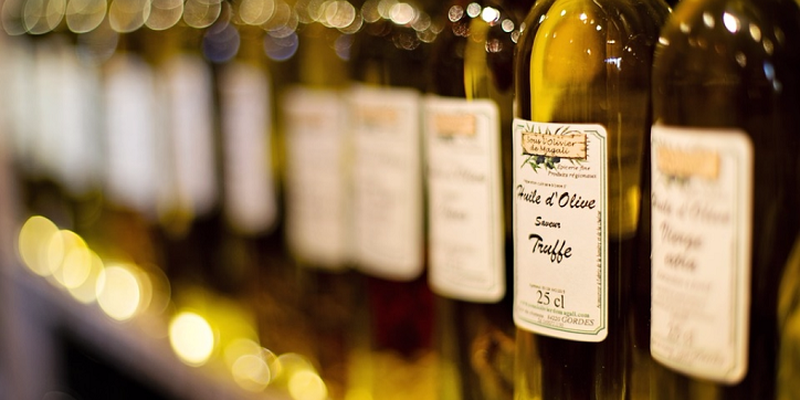When it comes to choosing the best cooking oil, it is no longer an easy choice. With so many varieties including vegetable, olive, hempseed, canola, coconut, avocado, sesame, extra virgin olive oil, infused oils with herbs and seasonings and a long list of many others, it can be overwhelming. Which should you choose? What do they all taste like? Are some healthier than others? In this article, we will cover olive oil vs. extra virgin olive oil, since they tend to be the most common oils found in many homes and kitchens.

Olive Oil vs. Extra Virgin Olive Oil
The Main Differences
Olive oil is a commonly used for baking, dressing, and frying since it has a low saturated fat content. One tablespoon of olive oil contains about 1.9 grams of saturated fat with only 10.3 gram of monounsaturated fat and only 1.2 grams of polyunsaturated fat. Olive oil has a high number of polyphenol antioxidants and contains fat-soluble vitamin E.
Extra virgin olive oil, or EVOO, is often used for salad dressing, dips and stir-fry as well because it often has a more olive flavor. The oil is produced through a cold pressing process of the pits and olives where no heat or chemicals are used. Virgin olive oil refers to the oil produced from the second pressing, which often has a lighter flavor.
So when you see “extra virgin” or just “virgin” oil, it refers to the process in which the oil was produced. Extra virgin olive oil has been touched or processed the least.
Any Difference in Flavors?
Oils are processed, and chemicals and heat are used to clean them and to extend its shelf life. While this can be beneficial to the food industry, it is not as beneficial for your body. The chemicals and heat essentially strip away the flavors and nutrients from the oil. So compared with normal olive oil, extra virgin olive oil that is fresh and unprocessed will have the following flavors:
Fruity (olives are considered a fruit.)
Bitter
Pepper flavorless
When there is a metallic or musty flavor or no flavor at all, this means the oil has either gone bad or has been over processed.
Olive oil vs. Extra Virgin Olive Oil on Health Benefits
While both contain the same number of calories and fat, the extra virgin olive oil contains a higher number of healthy nutrients and has fewer chemicals and free radicals. Extra virgin olive oil has more antioxidants, magnesium and chlorophyll as well as various vitamins such as K, A and E. Olive oil on the other lacks a number of these vitamins since they are stripped away from the heat and chemicals used while processing it.
While extra virgin olive oil may be a healthier option, a number of beneficial properties are lost when it is heated. Using extra virgin olive oil while cooking can destroy so much of its beneficial antioxidants so much that there is often no difference from using it or another refined cooking oil, like vegetable oil.
It must also be noted that the standards for classifying extra virgin olive oil are often unenforced and most major brands do not meet the standards for pure extra virgin olive oil. European regulators set up established guidelines for classifying olive oils and in a majority of instances, the international for extra virgin olive oil can vary a great deal. This may allow for olive oil to be marketed as “extra virgin” when it is not actually extra virgin olive oil.
So, Should You Buy Extra Virgin Olive Oil?
There can be a major price difference between olive oil and extra virgin olive oil, but the pricier extra virgin olive oil is worth the difference. For cold dishes and salad dressing, extra virgin olive oil is the best options. However, if you are using it mainly for cooking, it can be wiser to buy the cheaper olive oil or vegetable oil. Since you lose most of the health benefits through heating extra virgin olive oil, it is often no different than using olive oil.
What About Pure Olive Oil and Light Virgin Olive Oil?
Additional types of olive oil you might be wondering about include pure olive oil and light virgin olive oil. What exactly are they and how do they differ from the two mentioned above?
Pure olive oil is a combination of processed olive and extra virgin olive oil. The percentage of extra virgin olive is often quite low, most often only about 5% of the oil consists of extra virgin olive oil. It is often not as expensive as extra virgin olive oil and is ideal for baking since it has less olive flavor.
Light olive oil or extra light olive oil is one of the lowest quality olive oils. A significant amount of chemicals are used to remove impurities from the oil which results in a lighter color and flavor. Light olive oils often times is created by mixing other oils like canola oil. Many use this oil because it is often the cheapest and is great for baking since it has no olive flavor.
So if you want to arrange these olive oils based on the quality, from best to worst, that would be extra virgin olive oil, virgin olive oil, pure olive oil, olive oil, and lastly, light olive oil. If you choose from these oils, as we discussed above in olive oil vs. extra virgin olive oil part, they can be quite similar when used for cooking, but when you're not heating the oil, extra virgin olive oil is the highest quality oil to choose. However, even the highest quality oil is no replacement for actual vegetables, it should only be considered as a healthier fat/oil alternative.
View All Comments /Add Comment